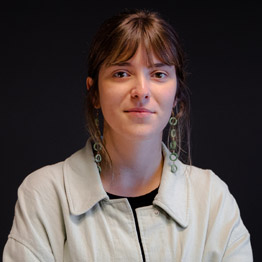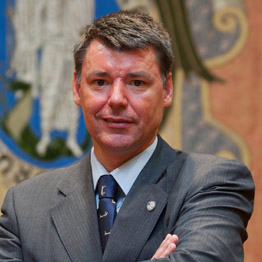Lope premieres comedy
(#LopeEstrenaComedia)
project nominated to the Talía Awards 2023
of the Academy of Performing Arts of Spain
in the category of "award from programs of study and knowledge dissemination"
Madrid, October 1613
His Majesty Philip III reigns in Spain, but the real ruler is his favourite, the corrupt Duke of Lerma, who has just bought -with the general approval of his neighbors civil service examination - the town of Arganda. In the Villa y Corte, the Republic of Letters is divided between supporters and detractors of the poetry of Don Luis de Góngora, whose poems culteranos have begun to circulate in manuscript form.
Cervantes has published his Novelas ejemplares this year, but he has not finished writing the promised second part of Don Quixote, which has been awaited since 1605, and Lope de Vega and his circle of friends are busy writing an apocryphal sequel, which will be published the following year under the name of a certain Alonso Fernández de Avellaneda.
For the rest, things continue more or less as usual: famine and depopulation, the economic drain of maintaining armies in Flanders and Italy, the threat of the Turk in the Mediterranean, the harassment of English and Dutch pirates against the fleets bringing silver from the Indies?
These are difficult times. But none of that seems to matter to the people of Madrid. In the streets and in the gossip mills there is no talk of anything else: "Lope premieres a comedy, Lope premieres a comedy...! It is known that the Fénix finished writing it in April, and now the company of Pedro de Valdés is rehearsing it, waiting for the last licenses for its representation to arrive soon. They say it is called La dama boba and that Jerónima de Burgos (wife of Valdés and, at the time, Lope's lover) will play the role of Nise... Those who have had the good fortune to read it also say that the comedy deals with the topic of the Education of women and their role in society. The expectation is tremendous: and there is nothing comparable to attend to a premiere of who has risen, for years, "with the scepter of the comic monarchy", as Cervantes said. Through the streets of Madrid, at average voice so as not to offend the grave ecclesiastics, the passionate fans of the Fénix recite their fervent prayer: "I believe in Lope de Vega almighty, poet of heaven and earth...".
COMING SOON
in the best social networks...
The project
With this project we intend to reconstruct (with a good historical-documentary base, but also with a touch of fiction) the premiere of La dama boba by Lope de Vega in 1613. The project is going to be developed in social networks (Twitter, Facebook, Instagram and LinkedIn) on October 24-31, 2022 and we will try to reflect what happened in Madrid those same days, October 24-31, but in 1613: the atmosphere in the days prior to the performance of the Phoenix play and the premiere itself, which was -presumably- on October 30. The circumstances related to that first performance of La dama boba by Lope de Vega are known to us, because the autograph manuscript of the play is preserved, with all the necessary licenses and approvals.
This will help the students -and also all those who follow us on social networks- to know, in an entertaining but very realistic way, how was a theatrical premiere in the Golden Age and also to deepen in the knowledge of this specific comedy by Lope de Vega, very interesting for raising the topic of the Education of women and their role in society.
In the development of the activity, three temporal planes will alternate, with different narrating voices representing different points of view: 1613, the year of the premiere, where Lope and his contemporaries will be present (his friends and family, his literary rivals and other anonymous characters of Madrid at the time); 1935, when Federico García Lorca premiered in Spain his adaptation of La dama boba, starring Margarita Xirgu; and 2022, already in our times, when a student from high school diploma has to read the Lopesque comedy for her Literature subject , with her reading impressions and reflections.
The team

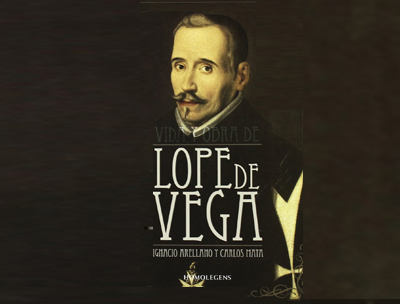
LIFE AND WORK OF LOPE DE VEGA
 Acknowledgements
Acknowledgements
and credits
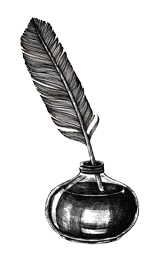
-
School of Philosophy and Letters of the University of Navarra
-
Jorge Valeiras (voice)
-
María Marcos (videos)
Image gallery
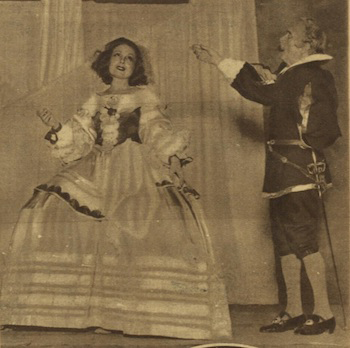
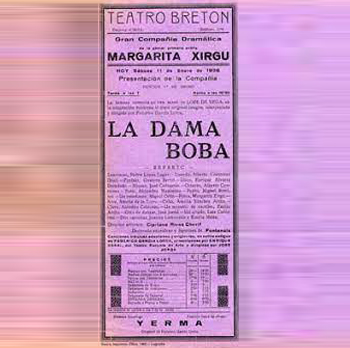
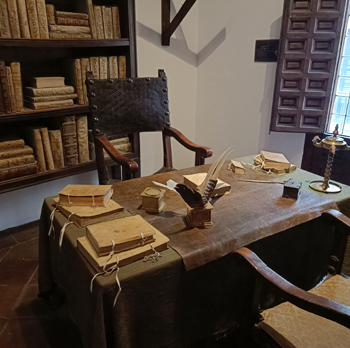
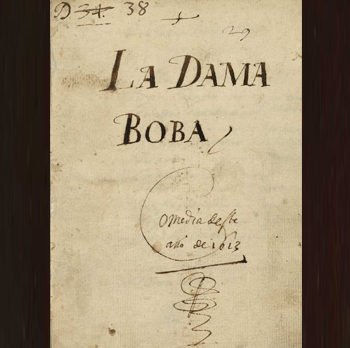
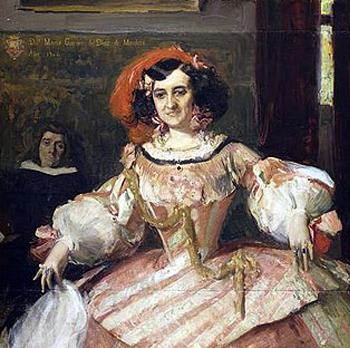
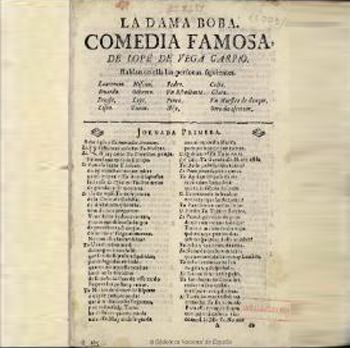
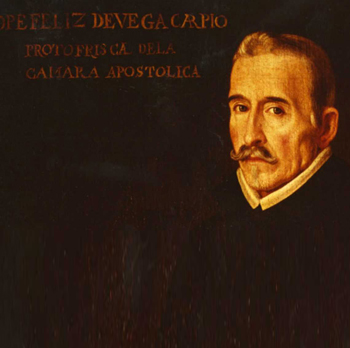
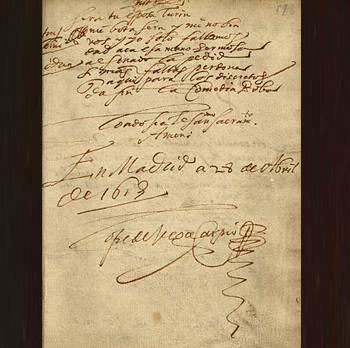
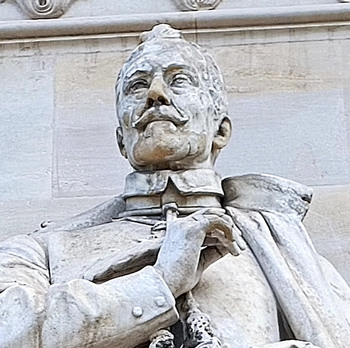
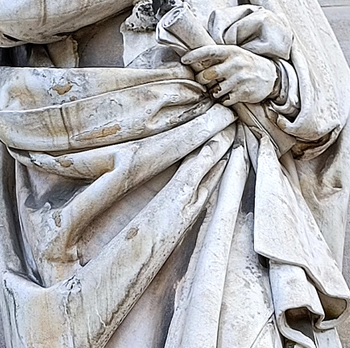
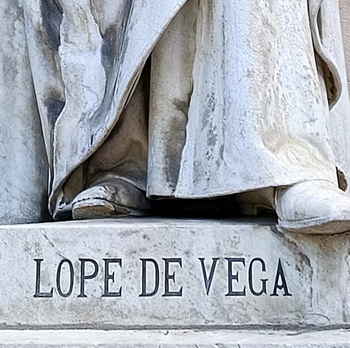
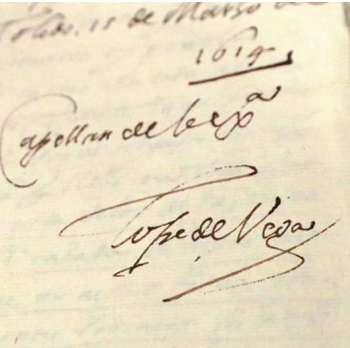
bibliography

We gather here an essential bibliography on Lope de Vega and La dama boba, and also on the Spanish theater of the Golden Age:
→ AGUILERA SASTRE, Juan, and LIZARRAGA VIZCARRA, Isabel, Federico García Lorca y el teatro clásico. La versión escénica de "La dama boba", 2nd revised ed., Logroño, Publishing Services de la Universidad de La Rioja, 2008.
→ AGUILERA SASTRE, Juan, and LIZARRAGA VIZCARRA, Isabel, "La versión de La dama boba de Federico García Lorca", in Javier Espejo Surós and Carlos Mata Induráin (eds.), Preludio a "La dama boba" de Lope de Vega (historia y crítica), Pamplona, Publishing Services de la Universidad de Navarra, 2020, pp. 237-255.
→ ARELLANO, Ignacio, Historia del teatro español del siglo XVII, Madrid, Chair, 1995.
→ ARELLANO, Ignacio, El arte de hacer comedias. programs of study sobre teatro del Siglo de Oro, Madrid, Library Services Nueva, 2011.
→ ARELLANO, Ignacio, and MATA, Carlos, Vida y obra de Lope, Madrid, Homo Legens, 2011.
→ ASTRANA MARÍN, Luis, Vida azarosa de Lope de Vega, 2nd ed., Barcelona, Juventud, 1941.
→ BARRERA, Cayetano Alberto de la, Nueva biografía de Lope de Vega, Madrid, Atlas, 1973-1974, 2 vols.
→ CASTRO, Américo, and RENNERT, Hugo Albert, Vida de Lope de Vega (1562-1635), with additional notes by Fernando Lázaro Carreter, Salamanca, Anaya, 1969.
→ COUDERC, Christophe, "La dama boba" by Lope de Vega, Neuilly, Atlande, 2019.
→ DE SALVO, Mimma, "Sobre el reparto de La dama boba de Lope de Vega", Voz y letra. Revista de literatura, 11.1, 2000, pp. 69-91.
→ DE SALVO, Mimma, "Notas sobre Lope de Vega y Jerónima de Burgos: un estado de la cuestión", in Beltrán, Haro, Sirera, Todera, Homenaje a Luis Quirante, vol. I, programs of study teatrales, Valencia, Anejos de Cuadernos de Philology, 2003, pp. 141-156.
→ DÍEZ BORQUE, José María, Sociología de la comedia española del siglo XVII, Madrid, Chair, 1976.
→ DÍEZ BORQUE, José María, Sociedad y teatro en la España de Lope de Vega, Barcelona, Bosch, 1978.
→ DÍEZ BORQUE, José María, Los espectáculos del teatro y de la fiesta en el Siglo de Oro español, Madrid, Ediciones del Laberinto, 2002.
→ DIXON, Victor, "Three early texts of Lope's La dama boba," yearbook Lope de Vega. Texto, literatura, cultura, 3, 1997, pp. 51-65.
→ ENTRAMBASAGUAS, Joaquín, El Madrid de Lope de Vega, Madrid, high school de programs of study Madrileños, 1952.
→ ENTRAMBASAGUAS, Joaquín de, programs of study sobre Lope de Vega, 2nd ed. corrected and enlarged, Madrid, committee Superior de Investigaciones Científicas, 1967.
→ ESPEJO SURÓS, Javier, and MATA INDURÁIN, Carlos, Preludio a "La dama boba" de Lope de Vega (historia y crítica), Pamplona, Publishing Services de la Universidad de Navarra, 2020.
→ GADEA, Alejandro, and DE SALVO, Mimma, "Jerónima de Burgos y Pedro de Valdés: biografía de un matrimonio de representantes en la España del Seiscientos," Diablotexto, 4-5, 1997-1998, pp. 143-175.
→ GONZÁLEZ MARTEL, Juan Manuel, Casa Museo Lope de Vega. guide and Catalog, Madrid, Comunidad Autónoma de Madrid, 1993.
→ LARSON, Donald R., "La dama boba and the Comic Sense of Life," Romanische Forschungen, 85, 1973, pp. 41-62.
→ MATA INDURÁIN, Carlos, "La comicidad en La dama boba", in Javier Espejo Surós and Carlos Mata Induráin (eds.), Preludio a "La dama boba" de Lope de Vega (historia y crítica), Pamplona, Publishing Services de la Universidad de Navarra, 2020, pp. 191-220.
→ NAVARRO DURÁN, Rosa, "Literatura y vida cotidiana en La dama boba", Cuadernos de teatro clásico, 17, 2003, pp. 111-127.
→ NAVARRO DURÁN, Rosa, "Los lenguajes poéticos en La dama boba: Lope de Vega vs. Góngora", in Javier Espejo Surós and Carlos Mata Induráin (eds.), Preludio a "La dama boba" de Lope de Vega (historia y crítica), Pamplona, Publishing Services of the University of Navarra, 2020, pp. 171-190.
→ NOGUÉS BRUNO, María, "La Education de la mujer en el Siglo de Oro y la construcción de los personajes femeninos de La dama boba", in Javier Espejo Surós and Carlos Mata Induráin (eds.),Preludio a "La dama boba" de Lope de Vega (historia y crítica), Pamplona, Publishing Services de la Universidad de Navarra, 2020, pp. 151-169.
→ PEDRAZA JIMÉNEZ, Felipe B., Cervantes y Lope de Vega. Historia de una enemistad y otros programs of study cervantinos, Barcelona, Octaedro, 2006.
→ PEDRAZA JIMÉNEZ, Felipe B., Lope de Vega. Vida y literatura, Valladolid, Universidad de Valladolid, 2008.
→ PEDRAZA JIMÉNEZ, Felipe B., Lope de Vega. Pasiones, obra y fortuna del "monstruo de naturaleza", Madrid, EDAF, 2009.
→ PEDRAZA JIMÉNEZ, Felipe B., "A vueltas con La dama boba", in La fuerza del amor y de la historia. Ensayos sobre el teatro de Lope de Vega, Cuenca, Universidad de Castilla-La Mancha, 2018, pp. 141-152.
→ PEDRAZA JIMÉNEZ, Felipe B., Lope de Vega's "Arte nuevo de hacer comedias": context and text, New York, high school of programs of study Auriseculares (IDEA), 2020.
→ PONCE CÁRDENAS, Jesús (ed.), Lope de Vega y el humanismo cristiano, Madrid / Frankfurt am Main, Iberoamericana / Vervuert, 2018.
→ PONCE CÁRDENAS, Jesús (ed.), Literatura y devoción en tiempos de Lope de Vega, Madrid / Frankfurt am Main, Iberoamericana / Vervuert, 2019.
→ PRESOTTO, framework, "La dama boba y la comedia cómica", in Germán Vega García-Luengos (ed.), De "La Celestina" a "La vida es sueño". Cinco lecciones sobre obras universales del teatro clásico español, Valladolid, Universidad de Valladolid, 2009, pp. 65-79.
→ PRESOTTO, framework, "Apuntes sobre el soneto "La calidad elementar resiste" y La dama boba", yearbook Lope de Vega. Texto, literatura, cultura, XIX, XIX, 2013, pp. 204-216.
→ SÁEZ RAPOSO, Francisco, Todo Madrid es teatro. Los escenarios de la Villa y Corte en el Siglo de Oro, Madrid, Comunidad de Madrid, 2018.
→ SÁNCHEZ JIMÉNEZ, Antonio, Lope. El verso y la vida, Madrid, Chair, 2018.
→ TRECCA, Simone, "La adaptación fílmica de La dama boba: Lope visto por Manuel Iborra", in Javier Espejo Surós and Carlos Mata Induráin (eds.), Preludio a "La dama boba" de Lope de Vega (historia y crítica), Pamplona, Publishing Services de la Universidad de Navarra, 2020, pp. 269-281.
→ VEGA, Lope de, Cartas ( 1604-1633), ed. by Antonio Carreño, Madrid, Chair, 2018.
→ VEGA, Lope de, Epistolario de Lope de Vega Carpio que por agreement de la Academia Española publica Agustín G. de Amezúa, Madrid, Real Academia Española, 1989, 2 vols.
→ VEGA, Lope de, La dama boba, ed. by Alonso Zamora Vicente, Madrid, Espasa Calpe, 2001.
→ VEGA, Lope de, La dama boba, ed. by Diego Marín, 27th ed., Madrid, Chair, 2007.
→ VEGA, Lope de, "La dama boba": critical edition and file digital, ed. by framework Presotto, Barcelona / Bologna, PROLOPE / Universitat Autònoma de Barcelona / Università di Bologna, 2015. available online.
→ VEGA, Lope de, Rimas humanas y divinas del graduate Tomé de Burguillos, ed. by Ignacio Arellano, Madrid / Frankfurt am Main, Iberoamericana / Vervuert, 2019.
→ VIDAL-FOLCH BALANZÓ, Ignacio, guide de la Casa Museo Lope de Vega, Madrid, Comunidad de Madrid, 2015.
→ VOSSLER, Karl, Lope de Vega y su tiempo, 2nd ed., Madrid, Revista de Occidente, 1940.
→ ZAMORA VICENTE, Alonso, Lope de Vega: su vida y su obra, Madrid, Gredos, 1961.
→ ZUBIETA, Mar, "La dama boba" by Lope de Vega, Madrid, Compañía Nacional de Teatro Clásico, 2002.





